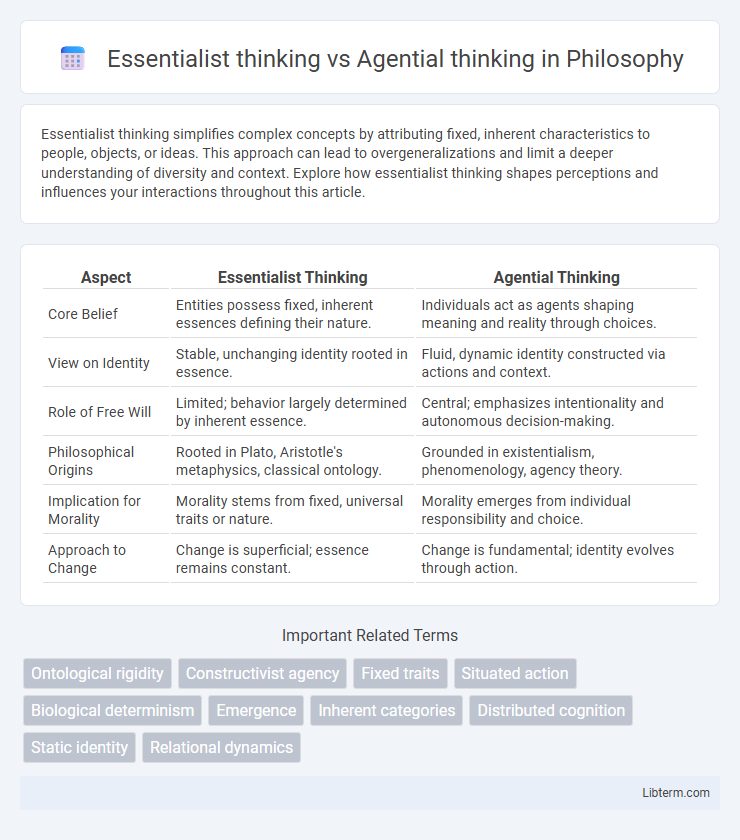Essentialist thinking simplifies complex concepts by attributing fixed, inherent characteristics to people, objects, or ideas. This approach can lead to overgeneralizations and limit a deeper understanding of diversity and context. Explore how essentialist thinking shapes perceptions and influences your interactions throughout this article.
Table of Comparison
| Aspect | Essentialist Thinking | Agential Thinking |
|---|---|---|
| Core Belief | Entities possess fixed, inherent essences defining their nature. | Individuals act as agents shaping meaning and reality through choices. |
| View on Identity | Stable, unchanging identity rooted in essence. | Fluid, dynamic identity constructed via actions and context. |
| Role of Free Will | Limited; behavior largely determined by inherent essence. | Central; emphasizes intentionality and autonomous decision-making. |
| Philosophical Origins | Rooted in Plato, Aristotle's metaphysics, classical ontology. | Grounded in existentialism, phenomenology, agency theory. |
| Implication for Morality | Morality stems from fixed, universal traits or nature. | Morality emerges from individual responsibility and choice. |
| Approach to Change | Change is superficial; essence remains constant. | Change is fundamental; identity evolves through action. |
Understanding Essentialist Thinking
Essentialist thinking categorizes individuals or objects based on inherent, immutable traits, often leading to stereotypes and fixed perceptions. This cognitive approach simplifies complex social phenomena by attributing causes to essential characteristics rather than situational factors. Understanding essentialist thinking reveals its impact on bias, social identity formation, and resistance to change in attitudes.
Defining Agential Thinking
Agential thinking emphasizes an individual's capacity to act independently and make choices that influence outcomes, highlighting personal agency over fixed traits or predetermined factors. This cognitive approach contrasts with essentialist thinking, which attributes behaviors and identities to inherent, unchangeable qualities. Understanding agential thinking involves recognizing the dynamic interplay between context, motivation, and deliberate action in shaping one's experiences and decisions.
Historical Perspectives on Both Modes
Essentialist thinking, rooted in ancient philosophical traditions, posits that entities possess inherent, unchanging characteristics defining their nature, influencing historical classifications in biology and social identity. Agential thinking emerged prominently during the Enlightenment, emphasizing individual autonomy and dynamic interaction between agents and their environments, shaping modern social theories and political philosophies. Historical perspectives reveal a shift from fixed essence toward recognizing contingent, context-dependent identities shaped by human agency.
Key Differences Between Essentialist and Agential Thought
Essentialist thinking emphasizes fixed, inherent characteristics that define entities, asserting that these traits determine identity and behavior, whereas agential thinking views individuals as active agents capable of change through decision-making and social context. Essentialism relies on static categories and universal truths, while agential thought prioritizes fluidity, individual choice, and situational influences. This fundamental difference influences perspectives in psychology, sociology, and philosophy, shaping debates on identity, responsibility, and social dynamics.
Impacts on Personal Identity Formation
Essentialist thinking shapes personal identity by emphasizing fixed traits and inherent characteristics, which can limit self-perception and resistance to change. In contrast, agential thinking promotes viewing identity as dynamic and self-constructed, encouraging adaptability and personal growth. This difference significantly influences how individuals navigate challenges and develop a coherent sense of self over time.
Influence in Social and Cultural Contexts
Essentialist thinking, which attributes fixed traits to social groups, shapes cultural stereotypes and reinforces systemic biases in societies. Agential thinking emphasizes individual autonomy and the capacity to change, fostering social movements that challenge traditional norms and promote cultural diversity. These contrasting perspectives influence how communities perceive identity, power dynamics, and possibilities for social transformation.
Role in Shaping Beliefs and Attitudes
Essentialist thinking shapes beliefs and attitudes by categorizing people and things based on perceived inherent, unchangeable traits, leading to fixed stereotypes and generalizations. Agential thinking emphasizes individual autonomy and context, fostering beliefs that recognize variability, personal choice, and social influence in shaping behavior. This contrast impacts how individuals interpret identity, responsibility, and social roles within cultural and psychological frameworks.
Practical Examples in Everyday Life
Essentialist thinking categorizes people and objects based on fixed, inherent traits, such as assuming a person is naturally good at math due to their gender. Agential thinking emphasizes individual choice and context, exemplified by recognizing that skills develop through effort and experience rather than innate ability. In everyday life, choosing to approach challenges with agential thinking fosters adaptability and personal growth, while essentialist thinking may limit opportunities and reinforce stereotypes.
Challenges and Critiques of Each Approach
Essentialist thinking faces challenges for oversimplifying complex phenomena by attributing fixed, innate qualities to entities, which can lead to stereotyping and ignore context-specific influences. Agential thinking is critiqued for sometimes underestimating structural constraints and systemic factors, risking an overemphasis on individual autonomy and agency. Both approaches require balanced integration to avoid reductionism and better capture the interplay between inherent traits and external conditions.
Moving Toward Integrated Thinking
Essentialist thinking emphasizes fixed traits and inherent qualities, while agential thinking highlights individual autonomy and contextual influences on behavior. Moving toward integrated thinking involves synthesizing these perspectives to understand both the stable essence of entities and their dynamic interactions within environments. This balanced approach fosters a comprehensive view that acknowledges innate characteristics alongside situational variability.
Essentialist thinking Infographic

 libterm.com
libterm.com